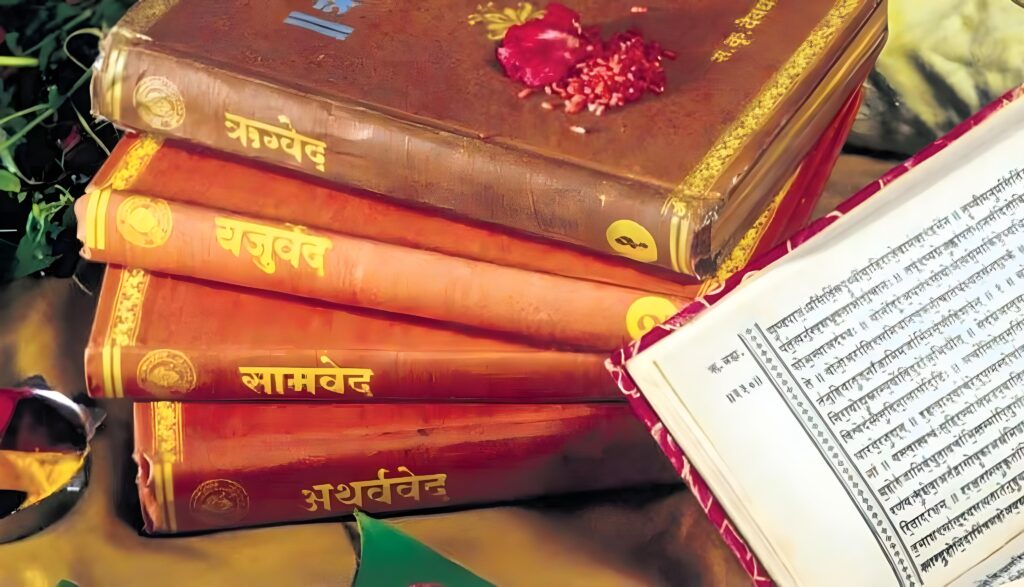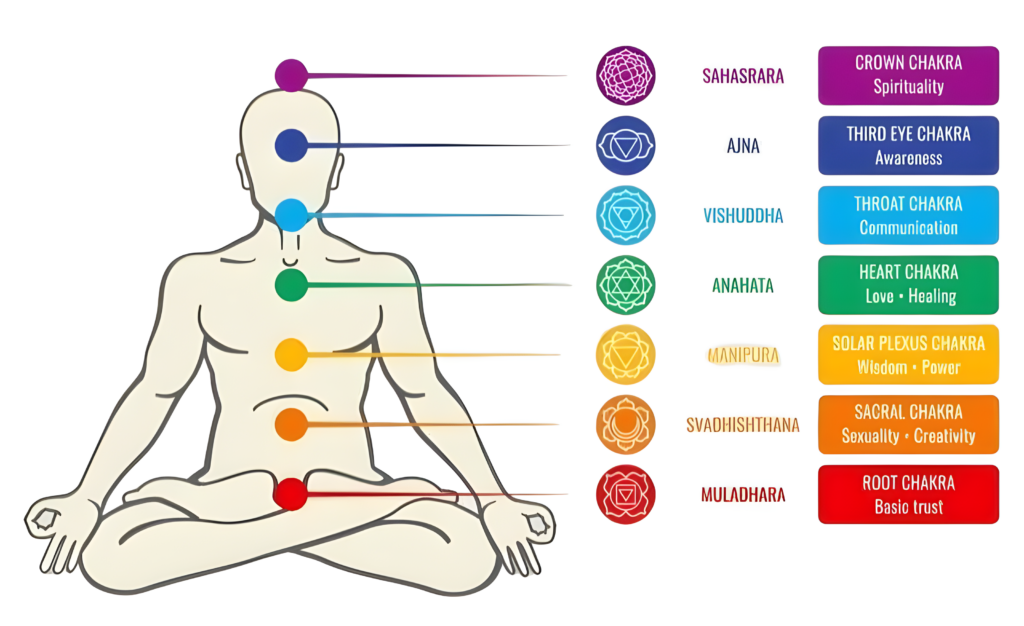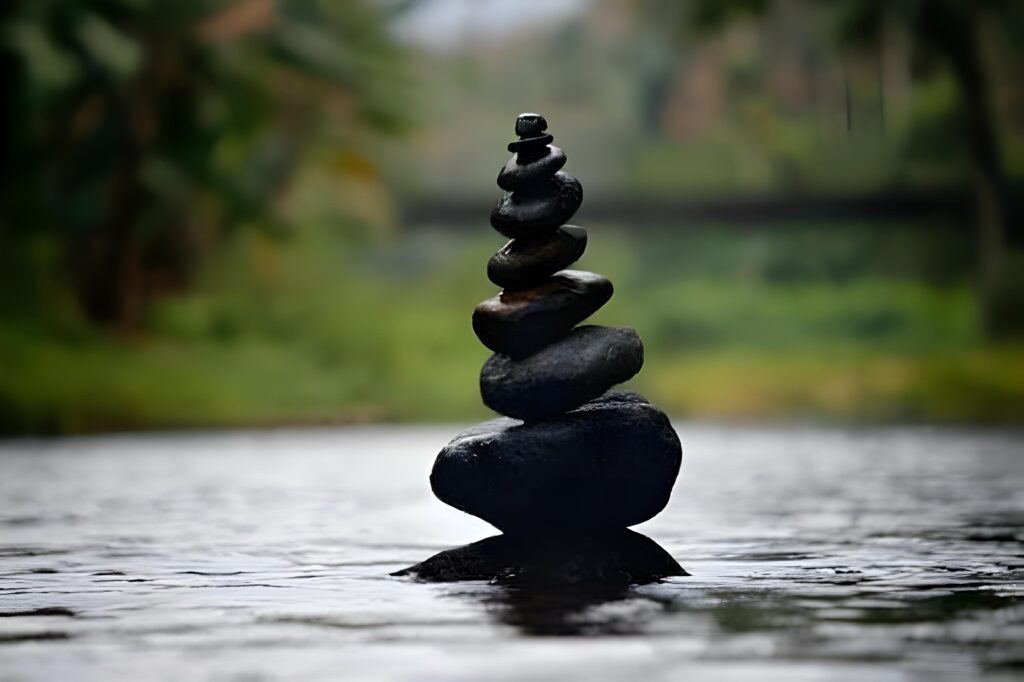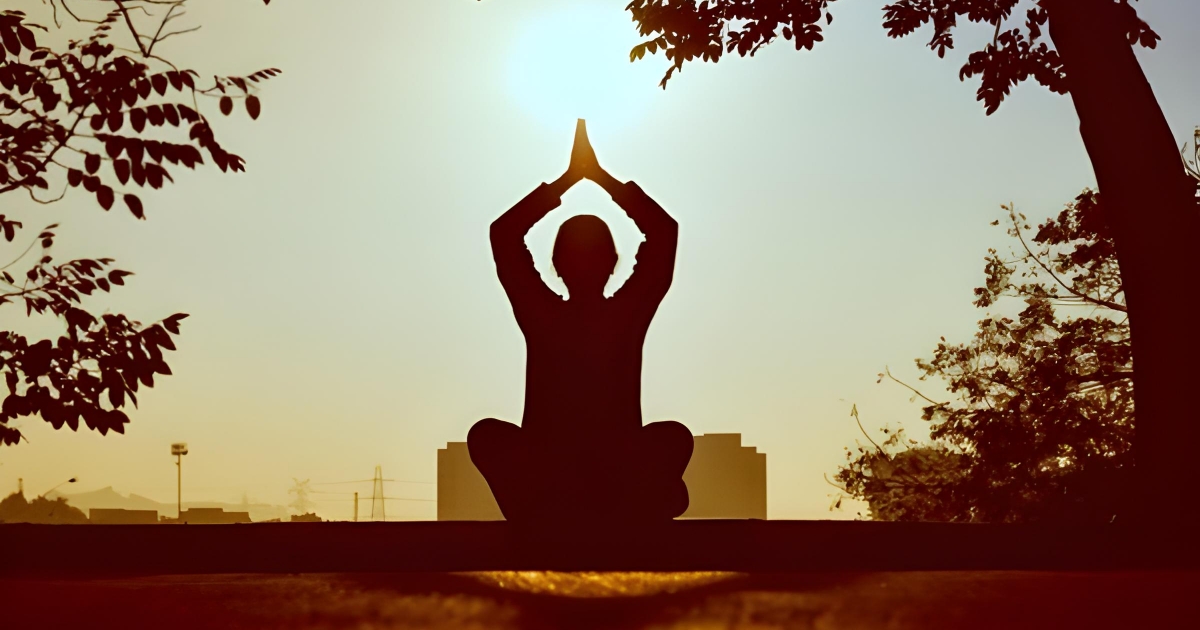Listen to this article:
Quick Tip: Explore the transformative power of mantras to enhance meditation, intuition, and spiritual connection.
“You want to deepen your meditation practice.”
“You want to tune in to your intuition.”
“You want to connect with the divine.”
Mantras are a wonderful and simple way to add a meaningful layer to your meditation practice.
The remainder of this article will demystify the practice of mantras by explaining their origins in Eastern religions such as Hinduism and Buddhism, how to incorporate these personal affirmations into your daily routine, and providing mantra examples for personal mantras, positive mantras, and famous mantras.
Contents
- 1 What Is A Mantra?
- 2 How To Incorporate Mantras In Your Daily Practice and Meditate?
- 3 How Do You Choose Your Own Personal Mantra?
- 4 Mudras and Mantra
- 5 Sanskrit Mantra
- 6 Buddhist Mantras
- 7 Chakra Mantras
- 8 Personal Mantra Examples
- 9 Benefits of Daily Mantras and Affirmations
- 10 The Science Behind the Repetition of Mantras and Neuroplasticity
- 11 FAQs
What Is A Mantra?

The word mantra is derived from two Sanskrit words, manas meaning mind, and tra meaning tool. Literally translated, it means mind tool, or, a tool for the mind. Practitioners use mantras to deepen their meditation practice by accessing their true selves and a higher power.
The earliest known use of mantras is in the Vedic Hindu scriptures. Hindu texts describe speech as divine, they believe in the sacredness of sound. Sound, including chanting and music is known to be an important part of Hindu rituals.
For years, only Brahmin priests were seen as worthy enough to chant the sacred mantras. However, upon the birth of the Hindu schools of Yoga, Vedanta, Tantra, and Bhakti mantras became part of the general practice of the Hindu religion. When Buddhism arose in India, it also adopted the practice of mantras.
Technically, any sound, word, or phrase that alters consciousness is a mantra. Their meaning, tone, rhythm, or physical vibration can create a shift in consciousness and facilitate a deep meditative state. It is thought that when they are chanted repetitively with devotion they create powerful vibrations in the body and mind.
Each mantra has its own power and intention behind it.
How To Incorporate Mantras In Your Daily Practice and Meditate?

Mantra repetition can be used to:
- reach higher states of consciousness
- set powerful intentions
- attract positive energy
- receive clarity about your own destiny
- enter a deeper state of present-moment awareness
Mantras can be recited in repetitions, or chanted with a melody.
Traditionally, mantras are recited 12, 17, 54, or 108 times. If you have mala beads, you can repeat the mantra as you move the mala through your fingers. Touching each bead individually as you recite the mantra 108 times. This will help guide you through the mantra practice, and charge your mala with positive energy and powerful intention.
You can also sing mantras with a melody. This is a beautiful practice that is wonderful to do in a group setting with instruments to experience sangha, spiritual community. Or, by yourself, you can easily look up mantras on Spotify and sing along with them.
You can recite the mantra:
- Out loud: chanting mantras out loud evokes a response from our environment and shifts the vibration of a space.
- Softly: chanting a mantra softly to yourself invokes a physiological response.
- Silently: chanting a mantra within your consciousness and awareness invokes a subtle energetic shift within yourself.
- Tuning in: You are listening to the mantra as it arises in your field of awareness, you are not “doing” the mantra.
Many people enjoy reciting their personal mantra before practicing silent meditation. The repetition of the mantra brings them into a state of stillness and calmness. Thus, it is a beneficial preparation for silent seated meditation. Others use mantra repetition as their primary meditation practice. Still, others might repeat a personal mantra while in a yoga class, doing the dishes, or driving. There is no one right way to use mantras.
How Do You Choose Your Own Personal Mantra?

Reflect on what it is you would like to work on in your life or in yourself right now.
What is your intention?
What is your focus?
What do you want to call in?
What do you want less of?
What do you want to align your life with?
Any meaningful affirmation to you can be used as your personal mantra. Below are many mantra examples you can use for self-esteem, happiness, positivity, inner peace, and abundance. There are also traditional mantra examples that call in specific Hindu deities.
No matter which mantra you feel called to work with right now, there are a few guiding principles to get the most out of it.
- Believable– you should have a strong belief in your personal mantra
- Specific– your personal mantra should be specific enough to manifest whatever it is you are seeking
- Positive– personal mantras should be worded as a positive phrase
- Personal– personalize your mantra to your own life and situation as much as possible
- Memorable– your personal mantra should be easy for you to remember as you chant or write it
Mudras and Mantra
It is common to pair a mudra with your personal mantra practice. Yoga mudras are symbolic gestures practiced with the hands and fingers. They facilitate the flow of energy through the subtle body and different parts of the brain. Undoubtedly you have seen and practiced the Gyan mudra, thumb and index finger touching, other three fingers held out straight. But there are more than 100 known mudras.
Gyan Mudra

Intention: Use with personal mantras to sharpen memory, and improve concentration. Use it when meditating for insight into your life or a specific issue.
How to: press the tip of your thumb and forefinger together, with the other three fingers held straight
Buddhi Mudra
Intention: Use with personal mantras for mental clarity and improved communication. Use it when meditating to understand intuitive messages such as dreams.
How to: press the tip of your thumb and pinky together, with the other three fingers held straight
Shuni Mudra
Intention: Use with personal mantras for improving intuition, alertness, and sensory powers.
How to: press the tip of your thumb and middle finger, with the other fingers held straight and relaxed.
Prana Mudra
Intention: Use with personal mantras for activating dormant energy in the body, and awakening and enlivening your personal prana, life force energy.
How to: touch your ring and pinky fingers to the tip of your thumb, hold your other two fingers straight up
Dhyana Mudra
Intention: Use with personal mantras for bringing you into a deeper and more profound meditation. This mudra brings tranquility and inner peace.
How to: sit with palms facing up, the right hand resting on the left, with thumbs held straight and the tips touching.
Apana Mudra
Intention: Use with personal mantras for eliminating physical, mental, and emotional waste from the body.
how to: press the tip of your thumb and middle and ring fingers together, hold the other two fingers up straight
Other popular mudras include Surya Mudra, Ganesha Mudra, Vayu Mudra, Rudra Mudra, and dozens of others.
Sanskrit Mantra

When chanting these sacred Hindu mantras, it is important to use uncharana, correct pronunciation.
Om – the sound of the universe.
The most widely known mantra, it is often used to open and close sacred circles. It is pronounced AUM. A is for Brahma, the beginning, the generator of the body; U is for Vishnu, the sustaining, the operator of breath; and M is for Shiva, the great destroyer.
So Hum – I am that.
Om Shanti Shanti Shanti – Om Peace Peace Peace.
This Shanti mantra is a simple prayer for peace. Shanti is the feminine, the moon, the goddess of creation.
Hari Om Tat Sat – All is one, and that is the truth; all is sacred.
Jai Ma – Hail the divine mother, glory to the divine feminine.
Alakh Niranjan – wake up true self, wake up illuminated self, wake up fearless self, I am awake.
Aham Prema – I am Love, Love of the great mystery.
Aham Brahmasmi – I am totality.
Lokaah Samastaah Sukhino Bhavantu – May all beings everywhere be happy and free, and may the thoughts, words, and actions of my own life contribute to that happiness and to that freedom for all.
Om Namo Bhagavate Vasudevaya – I call upon limitless, infinite sustenance of the divine, I surrender to the all-knowingness within and without; I tune into the all-knowingness of the cosmos.
Shiva Mantra
Om Namah Shivaya
I surrender my lower self into my true Self, I die to all ignorance so that I may be born anew; I recognize the fierce presence of freedom within me. I bow to Shiva within and without.
Shiva represents the masculine, the sun, and the energy of destruction. Known as the great destroyer, call in Shiva if you are ready to die to old habits and the old self to make room for the true highest self.
Gayatri Mantra
Om bhur bhuvah svaha
Tat savitur varenyam
Bhargo devasaya dhimahi
Dhiyo yo nah prachodayat
Call on the Sun Goddess that my heart may be illuminated, cleanse me of all delusions so I can shine forth like thou art shining.
Buddhist Mantras

Om Mani Padme Hum – Let the sacred Jewel of my lotus heart shine forth and bring light and joy to the world and to me.
This is the mantra of the Buddha of Compassion.
Chakra Mantras

If you are working to unblock, open, or activate a specific chakra, chanting its mantra will help. You can also find any of these mantras on Spotify or Youtube to tune in to while you meditate.
Lam- the mantra of the Muladhara, root chakra
Vam- the mantra of the Svadhisthana, sacral chakra
Ram- the mantra of the Manipura, solar plexus chakra
Yam- the mantra of the Anahata, heart chakra
Ham- the mantra of the Vishuddha, throat chakra
Om- the mantra of the Ajna and Sahasrara, the third eye and crown chakras
Personal Mantra Examples
The following mantra examples do not have a spiritual or traditional grounding. However, they can be used in the same way. They are positive affirmations to help you focus on your intentions.
Mantra Examples For Happiness

“I am allowed to prioritize my own happiness.”
“I determine my own happiness.”
“I manifest joy with my thoughts and actions.”
“With every inhale, my heart swells with love and joy.”
“I choose to be happy.”
“Every day is a new beginning.”
“All I need comes to me when I need it.”
“I am proud of myself.”
“I will live life and seek joy and happiness.”
“I will spread my love for life.”
“I deserve to be happy.”
“My life is whole, I am content.”
Mantra Examples For Choosing Your Own Destiny

“I am the architect of my life.”
“I am capable of achieving my goals.”
“I don’t wish for things, I work for them.”
“I desire greatness and I work for it.”
“I get out of my comfort zone to achieve my dreams.”
“I don’t have to go fast, I just have to go.”
“I focus on small and consistent actions.”
“I generate unstoppable momentum with every step I take toward my goal.”
“My passion pushes me to work towards my dreams.”
“The only way out is through.”
“I am proud of my accomplishments, they motivate me to continue.”
“I know bad times are temporary and I choose to push through.”
“I no longer allow fear to rule me.”
“I move forward with courage.”
“I say yes to new adventures.”
The best way to get something done is to begin.”
Mantra Examples For Self-Love and Self Esteem

“I am a divine being.”
“I am worthy of love.”
“I am worthy of taking up space.”
“I forgive myself.”
“I am confident in myself and my abilities.”
“I am strong.”
“I am intelligent, I am kind, I am important, I am enough.”
“I do my best every day, and each day that varies.”
“I am a human and I make mistakes but I still deserve love.”
“I evolve every day.”
“I focus on how far I have come, instead of how far I have to go.”
“I set healthy boundaries and put myself first.”
“I am my own best friend.”
“I deserve a partner who respects, loves, and supports me.”
“I am in love with who I am becoming.”
“I choose to step into my power.”
Mantra Examples For Positivity and Gratitude

“My life is a miracle and I respect it.”
“I attract good energy.”
“I surround myself with positive people.”
“My life is just beginning.”
“Today will be an excellent day.”
“Negative thoughts only have as much control as I allow.”
“Positive thoughts cleanse my soul.”
“I am grateful.”
“I have everything I need.”
“I am grateful for bumps in the road, they help guide my journey.”
“Only I can steal my joy.”
“I am proud of how far I have come.”
Mantra Examples for Anxiety and Inner Peace

“I am here and now.”
“I have power over my thoughts.”
“My thoughts are not me.”
“My thoughts do not define me.”
“I am worthy of a calm and peaceful life.”
“I release worry about what will happen in my life and let it flow.”
“I learn by doing, not thinking.”
“My thoughts are my choice, and I choose positive thoughts.”
“I refuse to let yesterday define today.”
“I release worry over things I cannot change or control.”
“I release attachment to outcomes, I trust in the Universe.”
“My life matters.”
“I am still.”
“I can remove myself from situations that do not serve me.”
“I am a warrior, not a worrier.”
“I choose peace.”
“I am free from others’ opinions of me.”
“I am not responsible for the feelings of others.”
Mantra Examples For Abundance

“I will have it all.”
“I focus on opportunities that come to me.”
“I have limitless potential.”
“My joy and happiness are abundant.”
“There is enough abundance in the world for everyone, I will receive my share.”
“I am worthy of making money.”
“I tap into the universe’s limitless supply of compassion, joy, magic, focus, and patience.”
“My passion is infinite and I will use it to guide my path.”
“Love radiates from me and returns to me tenfold.”
Benefits of Daily Mantras and Affirmations
Morning Affirmations
Starting your day with a morning affirmation can set a positive vibe. It’s like nourishing your mind with a hearty breakfast. Just as you wouldn’t skip the first meal of the day, a morning affirmation fuels your thoughts. It readies you for the challenges that lie ahead.
Bedtime Affirmations
Ending your day with a bedtime affirmation can help ease your mind. It’s a way to release the day’s tensions. This practice can enhance the quality of your sleep. A serene mind often results in a peaceful night.
Affirmations for Challenging Days
We all encounter difficult days. Having an affirmation for tough times is like having a hidden strength. It assists you in finding resilience when you’re feeling down. It serves as a reminder that adversities are temporary.
Daily Affirmations
Integrating affirmations into your daily schedule can be transformative. They assist in maintaining an optimistic mindset throughout the day, leading to better decision making and enhanced relationships.
Affirmations for Serenity and Tranquility
During moments of stress or anxiety, affirmations for peace can be incredibly calming. They aid in restoring your mind to equilibrium, which is crucial for both mental and physical well being.
Positive Affirmation Practices
Practicing affirmations that foster positive thinking can alter your perspective on life.
They suggest looking for the silver lining in every situation, which can result in increased joy and contentment.
Work Chants
Incorporating chants into your work routine can heighten your concentration and efficiency. They assist in conquering feelings of being overwhelmed, ultimately making you more productive and successful in your tasks.
Fitness Chants
While engaging in physical exercise, using fitness chants can boost your stamina and perseverance. They serve as a source of motivation, especially during challenging moments, aiding you in reaching your fitness objectives more swiftly.
Simple yet impactful, daily chants serve as valuable tools. They influence your mindset and consequently impact your life. Why not select a few and witness the positive transformations firsthand?
The Science Behind the Repetition of Mantras and Neuroplasticity
Mantras are not just words; they carry significant meaning and power that can inspire and motivate individuals. When you repeat a mantra daily, you are essentially creating a positive statement that boosts your confidence and helps you develop a growth mindset. The repetition of a mantra can help remind you of what’s important and inspire you to live your best life.
One of the most common mantras is “om”, a phrase spoken in Sanskrit and used in meditation practices. By repeatedly chanting this mantra, you can train your mind and body to stay focused and positively impact the world around you.
For those struggling with self-doubt or facing an obstacle, finding a new mantra that resonates with them can make a world of difference. Whether it’s an inspirational quote or a motivational phrase, mantras have the power to inspire you to keep pushing forward every step of the way.
By journaling your favorite mantras and keep repeating them on a daily basis, you can help retrain your brain and build the confidence you need to overcome any challenge that comes your way.
Exploring Neuroplasticity
Have you ever thought about how repeating a mantra could actually alter your brain? It all comes down to neuroplasticity, which is the brain’s capacity to restructure itself by forming fresh neural connections. It’s truly intriguing!
Mantras and Mental Pathways
When you repeat a mantra, you’re essentially creating a pathway in your brain. Each repetition fortifies this pathway, making it more distinct over time, like a well worn trail in a dense forest. This can shape your thought patterns.
The Importance of Repetition
Repetition plays a crucial role in this process. Just as muscles develop through consistent workouts, neural pathways become stronger with regular use. Every time you recite your mantra, you solidify this new mental practice. It’s a potent tool for personal growth.
Long-Term Advantages
The lasting benefits are profound. Regular practice of mantras can enhance concentration, lessen stress levels and foster an overall sense of tranquility. It’s not just about momentary change but about permanently transforming your mental landscape.
Personal Reflections
From my own experience with practicing mantras, I’ve witnessed notable transformations. Initially, maintaining focus was challenging. Nevertheless, with perseverance, the mantra evolved into a stabilizing influence.
It feels like having a guiding light, helping me stay grounded in the midst of life’s unpredictable moments.
Integrating this insight into your daily mantra routine can enhance your recognition of its influence. It’s more than just a spiritual activity; it’s like giving your brain a good workout!
Pop quiz! 🧘🤔
Mantras were originally only chanted by Brahmin priests in Hinduism.
Mantras need to be chanted loudly to be effective.
The mantra Om symbolizes the sound of the universe in Hindu tradition.
FAQs
What is the difference between a spiritual mantra and a personal mantra?
Personal mantra examples can really be anything positive affirmation you choose to repeat to yourself. Spiritual mantras are grounded in a religion and have a traditional meaning.
What is the 5-word mantra meditation?
Simply repeat these five words for one minute each- release, peace, tranquility, love, joy.
What are famous mantra examples?
A few examples are Om, the Gayatri mantra, and the Shiva mantra are some of the most commonly used mantras and are very powerful for raising your state of consciousness and bringing you into deep meditation.
What is a good mantra?
A good mantra is any affirmative phrase that is positive, and you strongly believe in.







